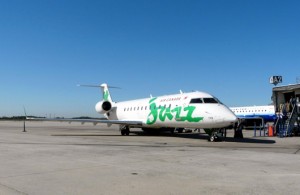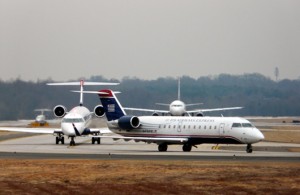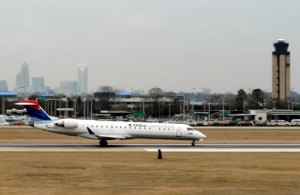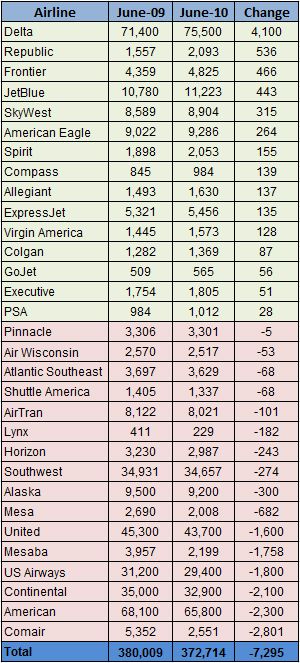When passion, creativity, photography and the ability to write combine with fans, I love to share their work. This is a blog written by Andrew Vane for Airline Reporter taking a close look at Bombardier’s CRJs:
Canadian company Bombardier Aerospace acquired government-owned Canadair Ltd and entered the regional jet market in the 1980’s. Today the most commonly seen and flown CRJ’s consist of the CRJ-200 (50 seats), CRJ 700 (75 seats) and CRJ900 (90 seats). CRJ’s are most popular amongst the major airline’s subsidiaries for shorter domestic flights between hubs and along spokes. Here in Charlotte (KCLT), virtually all of Terminal E is occupied by gates to serve regional jets and turboprops. Similarly, in Cincinnati/Northern Kentucky Airport (KCVG), Delta dedicated a major portion of the largest terminal to their regional jet carrier Comair.

No this ain’t headed for New Orleans. It’s an Air Canada Jazz CRJ 200 bound for the Great White North.
The CRJ 200 is an upgrade to its -100 predecessor with the addition of more efficient engines coming in Extended Range (ER) and Long Range (LR) versions. Guess which one is longer? Answer: Without consulting Bombardier’s data, your guess is as good as mine. (Per the web site the range of the ER is about 1,800 miles and the LR version is 2,300 miles.) CRJ 100/200’s are most common domestically among the major airliner’s regional carriers Comair, Skywest, ASA, Air Canada, MESA, US Airways Express (PSA), Skywest and Republic.
First entering service in 2001, the CRJ 700 series provided a bit more seats and comparable range to the LR version of the CRJ 200. In profile, the easiest way to tell the difference between a -200 and -700 is the fact that the -700 is longer and the rear end is sticking up in the air. In addition to more seating, the CRJ700 features a new wing with leading edge slats and a stretched and slightly widened fuselage, with a lowered floor. CRJ 700’s are most frequently flown in the US by Air Canada Jazz, American Eagle, ASA, Comair, Horizon Air, Mesa, Skywest, and US Airways Express (PSA). A further refinement of the CRJ 700 was the CRJ 705 series, operated by Air Canada, which added 75 seats and split the aircraft into business and economy classes of 10 and 65 seats, respectively. Only sixteen 705’s were built.
Eventually, this French Canadian company, who also produces the popular Dash-8 family of turboprops, expanded the CRJ fleet design to include a longer -900 version. The CRJ 900 features a ’œcomplete re-design of all of the structure and systems. In addition, an all-new wing was developed that increases the cruise speed of these aircraft while offering excellent airfield characteristics. These aircraft also feature an all new interior cabin that offers increased room for the passenger, enabled by a lowering the floor by 1’ (2.54 cm) and redesigning the aircraft frame RJ900 that featured as of the original CRJ200, offering more headroom and a wider cabin. The seating and bins were completely redesigned to allow more passenger space and increased bin stowage,’ says Bombardier’s web site. CRJ 900’s are currently operated by Mesa Air, Air Canada Jazz, Skywest, Comair and Pinnacle Airlines.
From my own personal experience, I was a bit disappointed with the window placing and height for my 6-foot tall frame. I ended up with a neck ache each time I sat by a window. The windows are much lower compared to Bombardier’s Brazilian competitor, Embraer.
Some airlines have planned a future full of regional jets in lieu of larger aircraft with empty seats. Smaller aircraft lower to the ground provide easier boarding in variable conditions (jetway or stairs). With over 700 CRJ’s of all versions delivered by Bombardier in the last 30 years, chances are you’ll be riding in one of these the next time you fly out of a small city.
Bombardier’s CRJ story here.
Images: All photos by Andrew Vane


